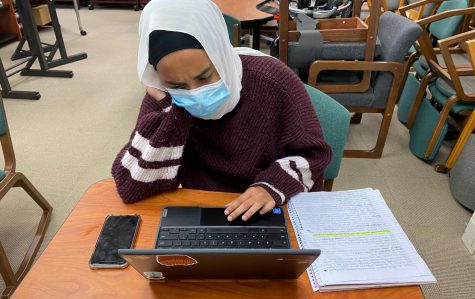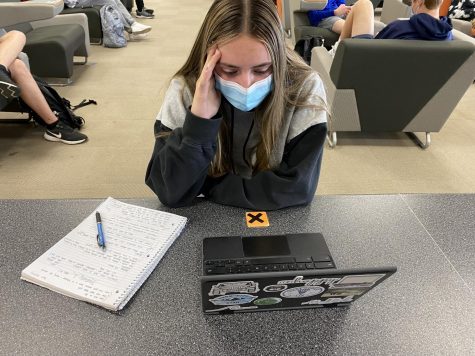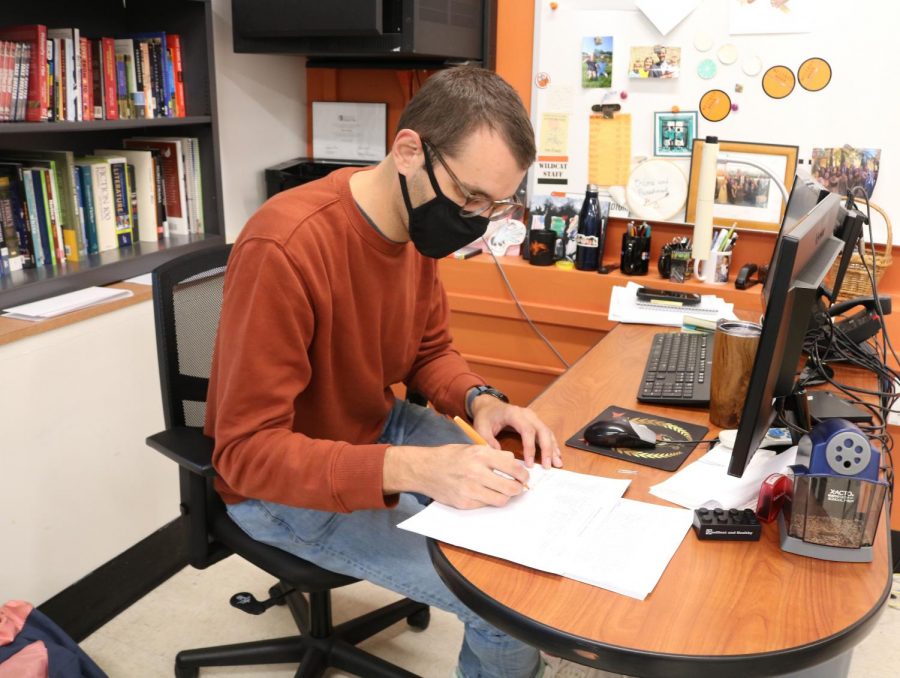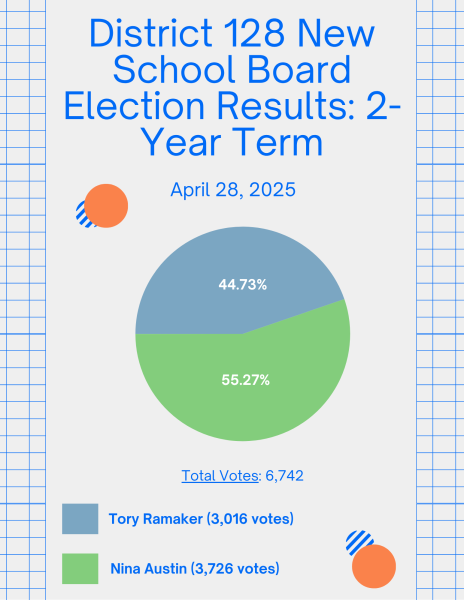Reassessing Assessments: New Grading Reforms
English teacher Ryan Ebling grades student assignments while utilizing new grading practices. He is using a rubric that grades students on a scale from one to five.
The last year and a half has been full of change, from how we interact with our friends and family, to how we work and go to school. The system that teachers use to evaluate students has not been immune to this change. Since the COVID-19 pandemic, grading has undergone various reforms.
According to Raymond Albin, Libertyville High School’s assistant principal, LHS administration is “always encouraging our teachers to reflect on their grading system, and look for improvements,” both before the pandemic and now.
During the 2019-2020 school year, changes had to be rapidly made to both school and grading. Due to the extenuating circumstances of the pandemic and emergency e-school, the main goal of teachers across the state became “no educational harm to any child,” according to the Community High School District 128 E-Learning Plan.
Grades could not go down for the remainder of the year, and teachers could not mandate synchronous classes.
Once the school year ended, LHS had more time to come up with a comprehensive plan for how students should be graded during remote learning. In the 2020-2021 school year, classes were mandated to be synchronous, and grades did matter, but there was still a strong emphasis on doing as little harm as possible to students’ grades.

Now, e-school is over, after more than a year of turmoil. Students moved from various schedule formats, different levels of in-person learning, and more. For the first time since spring of 2019, every single student is, once again, participating in full in-person learning.
As remote learning came to an end, some of the changes to grading methods made did not. LHS administrators have worked to establish loose guidelines for teachers on how they grade their students, based on what was learned from the pandemic.
“Admin definitely worked with our teachers when we came up with this guidance,” emphasized Albin. “Yes, it was put out by the admin team, but [the idea behind] it was not absent of working with a rather large group . . . of teachers.”
Teachers are required by LHS administration to offer some sort of retake policy to students, according to Albin. Some teachers have offered an unlimited number of retakes, while others’ policies are more limited; for example, only allowing retakes for a certain amount of time after the test or requiring students to complete extra practice work before they are eligible to retake a test.
Another reform that has been enforced by LHS administration is that all teachers must include a policy for late work, meaning that all students would be able to turn in work late for at least partial credit.
On top of this guidance from administration, many teachers began to reevaluate the way they grade students. Ryan Ebling, an English teacher at LHS who has adopted many reforms to his grading policy over the course of around four years, explained his decision.
“[I] felt like the way I was grading wasn’t accurate to what students could do. I was seeing in class students who were really capable, but the way I assessed them wasn’t showing that. And so, instead of thinking that there was something wrong with my students, I and other teachers started thinking that there was probably something wrong with the way we assess [students].”
One common change has been the removal of homework points from the gradebook, in favor of assessments being worth 100 percent of students’ grades.
“A student’s grade should represent their understanding of the standards covered in my math class, rather than outside factors related to their behavior or environment such as participation, effort, extra credit, or homework completion,” said LHS math teacher Christee Joesten in an interview via email.
This change isn’t the standard, as many teachers still count homework points as a part of students’ grades, including Spanish teacher Megan Colombo, who explained her choice.
“Due to the constraints of a 45 minute period . . . I have to use class time to practice skills and to cover content . . . And [time] flies by. So there is not often time in class when we can sit and read and process, when I could use class time to advance our goals for other reasons . . . There’s all different ways to practice that in class. If I give an assignment [for homework], it is something that is . . . more straightforward . . . that perhaps in class, we simply just did not have time to cover.”
Often, participation and homework points have been used to prop up students’ grades or help them maintain their desired grade, even if they are not able to do well on tests. The reliance on tests has also been difficult for some students who have trouble taking tests, including sophomore Jana Badawi.
“I’m not a very good tester,” said Badawi, “so I’ve always relied on homework or assignments to keep my grades up. If somebody is not a very good tester, it might be way more challenging for them to have a good grade in classes.”

On the other hand, some students found that they preferred the emphasis on tests as all of their grade.
“I think [the new grading system] is more fair because it addresses grades holistically; rather than each individual point, it’s more [about whether] you understand the general concepts,” said Ryan McGrory, a senior at LHS.
Many students have had to reevaluate how they spend their time doing school work. Commonly, students have cut back on homework time in favor of studying concepts more.
McGrory explained, “Since, in certain classes, [homework] doesn’t count in the gradebook, I’ve kind of stopped doing it as much . . . In the past, I’ve been forced to do homework . . . whereas this year, if I have some homework that I already [understand], I’m [able] to not do it . . . and focus on other things.”
“I feel like I’m a little more lazy with my homework because of how much less it’s counted for [in the gradebook] . . . So, [the new grading policy] kind of made me have worse time management skills, I guess,” said Jack Distenfield, a senior at LHS.
For some, this shift in the way grades are evaluated has been taking place over the course of many years, as opposed to a shift in mentality as a byproduct of the COVID-19 pandemic.
“None of the things that [LHS administration] asked [teachers] to do, like retake policies or late policies, were new to me,” said Ebling. “Those are things that I’ve been doing in my classes since the World Lit team . . . really started reassessing the way we assess students [around] four years ago now, so I am glad to see that more [teachers] have retake policies.”
Regardless of what students and teachers alike think of new reforms to the way students are graded, this has certainly been quite a change, and will take time to get used to.
“Overall, [the new grading system] has helped me balance my time,” explained McGrory. “I think that it’s helped me feel a little bit less stressed about school, just knowing that I have opportunities for retakes.”









